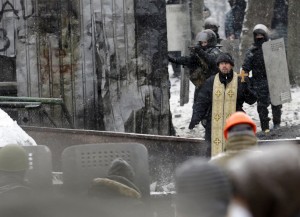
On the day of their return, they should prostrate themselves at the completion of each Hour of the Divine Office and ask the prayers of the entire community for any sins they may have committed by seeing or hearing evil, or by idle chatter.
Why not travel?
I have been reflecting on the different types of monks this week due in part to my reading of The Conferences of Cassian. In Conference 18, Cassian hears from Abba Piamun of the three types of monks that have developed over the monastic tradition. It is clear from reading this document that St. Benedict took much from the wisdom of the Fathers and used their work to construct his Rule.
Abba Piamun names the types of monks as cenobites (coenobites), hermits and Sarabaites. Cenobites are ‘monks living in a community under the government of a single elder.’ Hermits are ‘men who have first been trained in communities to the life of virtue and have then chosen to live a completely hidden and solitary life.’ Sarabaites, however, do not come out well.
The third, and culpable, kind is the Sarabaites… They are descended from Ananias and Sapphira. They do not follow the perfect way: they prefer to pretend to follow it. No doubt they want to be rivals of, and to gain the kind of credit given to, people who choose Christ’s utter poverty above all the riches of the world. They pursue true goodness feebly. They must needs become monks in order to gain the repute of monks, but they make no effort to follow their discipline, disregard the rules of the communities, are outside all control from the elders, fail to use the elders’ traditions to conquer their self-will. They… go on living in their homes just as before, carrying on the same work; or they build cells for themselves, call them ‘monasteries’ and live in them as they please… Shirking the austere rule of a community: living two or three together in a cell; under no direction: aiming above all else at having freedom from the elders, of going where they like, and of satisfying whatever passion they like – they are more busied about the necessities of life day and night than are coenobites. (Cassian, The Conferences of Cassian, “Conference 18: Conference of Abba Piamun on the three sorts of monks”, Owen Chadwick (trans.), Library of Christian Classics Volume XII: Western Asceticism (London: SCM Press, 1958) p.268-269)
And that is an abridged version!
St. Benedict’s treatment of the Sarabaites gives the same cutting critique.
…unschooled by any rule, untested, as gold is by fire, but soft as lead, living in and of the world… They live together in twos or threes, more often alone, without a shepherd in their own fold, not the Lord’s. Their only law is the pleasure of their desires, and whatever they wish or choose they call holy. They consider whatever they dislike unlawful. (St Benedict, Anthony C. Meisel and M. L. del Mastro (trans.), The Rule of St Benedict, “Chapter 1:the different kinds of monks and their customs” (New York: Doubleday, 1975) p.47)
Critics of the New Monastic Movement are right in holding these excerpts as a mirror on those of us who are exploring this emerging vocation. We who are undertaking a discernment to what God might be doing within his Church must take these dangers seriously and face up to the wisdom found within them.
St. Benedict also describes a fourth kind of monk: the gyratory monks.
All their lives they wander in different countries staying in various monasteries for three or four days at a time. They are restless, servants to the seduction of their own will and appetites, and are much worse in all things than the Sarabaites. (Ibid.)
The distinction, it seems, between Sarabaites and gyratory monks is the travelling. They move around and don’t remain in a place for long. They are nomads with no security from which to grow. It is in the light of this view that St. Benedict gives such a strict view on monks leaving the monastery at any moment or whim.
St. Benedict does not refuse travel but it must be necessary and even then, it is carefully managed by the abbot and community. Outside the monastery is seen as a barren place which is dangerous terrain to walk in. Monks should seek to return quickly and settle back into monastic life.
Reflection
It is for the above reasons that the New Monastic Movement has adopted a model based more friars rather than monks. The friars, or mendicants, adopt a lifestyle of poverty, travelling, and living in urban areas preaching, evangelisation and ministry, especially to the poor. The mendicant orders have a Rule and an abbot figure called by various names depending on the different orders. The mendicants were released from the traditional interpretation of the Benedictine vow to stability giving them freedom to roam and preach where need is found.
I find myself caught between the monastic and the mendicant.
I am passionate about preaching good news to all who I meet. I want to see transformation in people’s lives brought about by a relationship with the living Lord. I want to see the Church equipped for the mission of co-labouring with God and seeing the Kingdom of God established amongst us. this life is one of journeying and going, meeting people where they are and dwelling with them.
I also feel, however, a deep yearning to remain rooted. I have spoken recently about this vision of a mountain goat being built for rough terrain and yet having a deep need for ‘home’. I am one who needs a tent/dwelling in the wilderness. Although I want to go out and work for the gospel I also need, in order to sustain myself, a stability in my life.
It is in the tension of these two calls that I find myself crying out to God to reveal to me, perhaps a new order that is a balancing of the monastic and the mendicant. I deep sense of a movement that has a deep understanding of the Christian as ‘tent-dweller’, both rooted and stable and yet nomadic.
The emergence of urban centers meant concentrated numbers of the homeless and the sick. This created problems for the parish churches who found themselves unable to address these issues. In response to this crisis, there emerged the new mendicant orders founded by Francis of Assisi (c.1181-1226) and Dominic of Guzmán (c.1170-1234).(“The Mendicant Orders”, University of Saint Thomas–Saint Paul, Minnesota, 2003, http://courseweb.stthomas.edu/medieval/francis/mendicant.htm)
It is as I come to the end of my reflections on the Rule of St. Benedict that I discover a ‘monastic’ response to crises felt within the parish system. This is not to say that the reflections on the Benedictine Rule has been wasted, in fact I feel that the New Monastic Movement may be becoming a potential answer to my personal questions in a blending of the mendicant and monastic. It is this reconciling of the two which, I feel, is the unique charism for our time and this movement. This is the new thing that is emerging amongst us in the Western Church. From both these ends of the spectrum we can learn and discover the balance we seek.
These conversations between those who are more mendicant in their vision and vocation and those who are more Benedictine will be rife with misunderstandings and divisions of purpose but I feel that if we can remain faithful to one another, there is a space that is evolving where all can serve together. These conversations must be done with the utmost prayer and sensitivity of the Spirit. There must be a deep commitment throughout the discernment and conversations to faithfulness, inner change/conversion and obedience to the Lord who directs and guides us. Over the next few years I desire to see the New Monastic Movement come together from the different backgrounds and shapes and dedicate themselves to prayer, study and mission and seek to find the commonality which will unite us and see Lord bless and heal our world.
Holy God, who calls all things into oneness yet holds difference within, bring forth from amongst your people a vision for the future of discipleship and mission. May we discern from the movement of your Holy Spirit how you are redeeming and healing the brokenness of your Church to grow in the likeness and obedience to Jesus Christ our Lord.
Come, Lord Jesus

 …Ok. Since I wrote that reflection there has been a growing sense of some footing being lost amongst us. We have felt, at different moments, that we have lost our way or the passion has waned. This has been due to various small events in the life of our community which have combined to create not a destruction or a despair but a niggle, a question to arise: what are we doing?
…Ok. Since I wrote that reflection there has been a growing sense of some footing being lost amongst us. We have felt, at different moments, that we have lost our way or the passion has waned. This has been due to various small events in the life of our community which have combined to create not a destruction or a despair but a niggle, a question to arise: what are we doing? A wise brother amongst us wrote a deeply honest and profound response to my call for a discussion. He named the beauty of Burning Fences as ‘a clearing’. He writes,
A wise brother amongst us wrote a deeply honest and profound response to my call for a discussion. He named the beauty of Burning Fences as ‘a clearing’. He writes, This is our quest: to inhabit, together, No-Man’s Land. To share the space making no claim on it for ourselves or the parties, agendas and personal empires which we are tempted to enforce. We desire, however, to build our home there for to be at peace one must feel a sense of belonging. To what are we committing and how can that be spoken in this between place?
This is our quest: to inhabit, together, No-Man’s Land. To share the space making no claim on it for ourselves or the parties, agendas and personal empires which we are tempted to enforce. We desire, however, to build our home there for to be at peace one must feel a sense of belonging. To what are we committing and how can that be spoken in this between place?